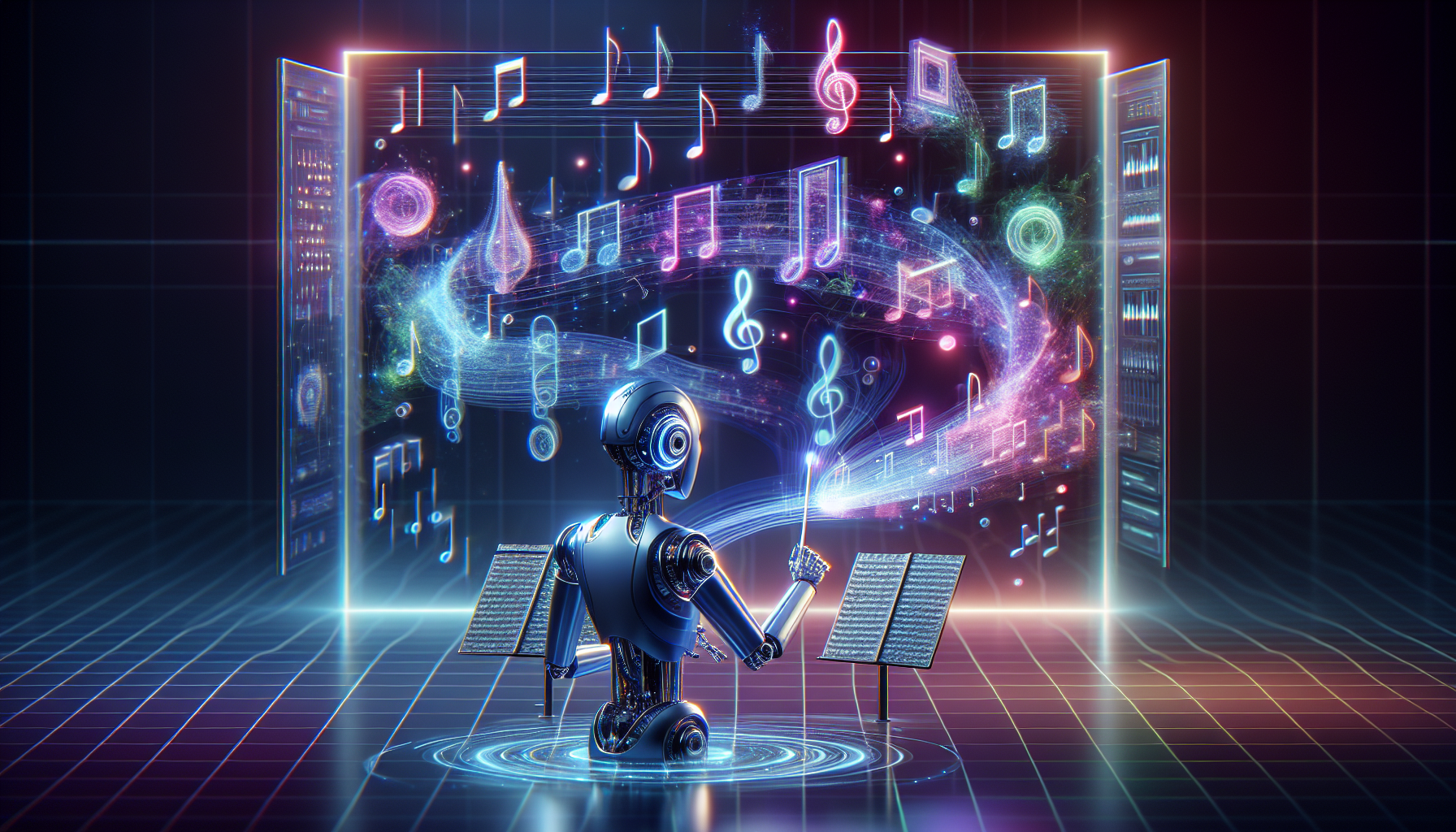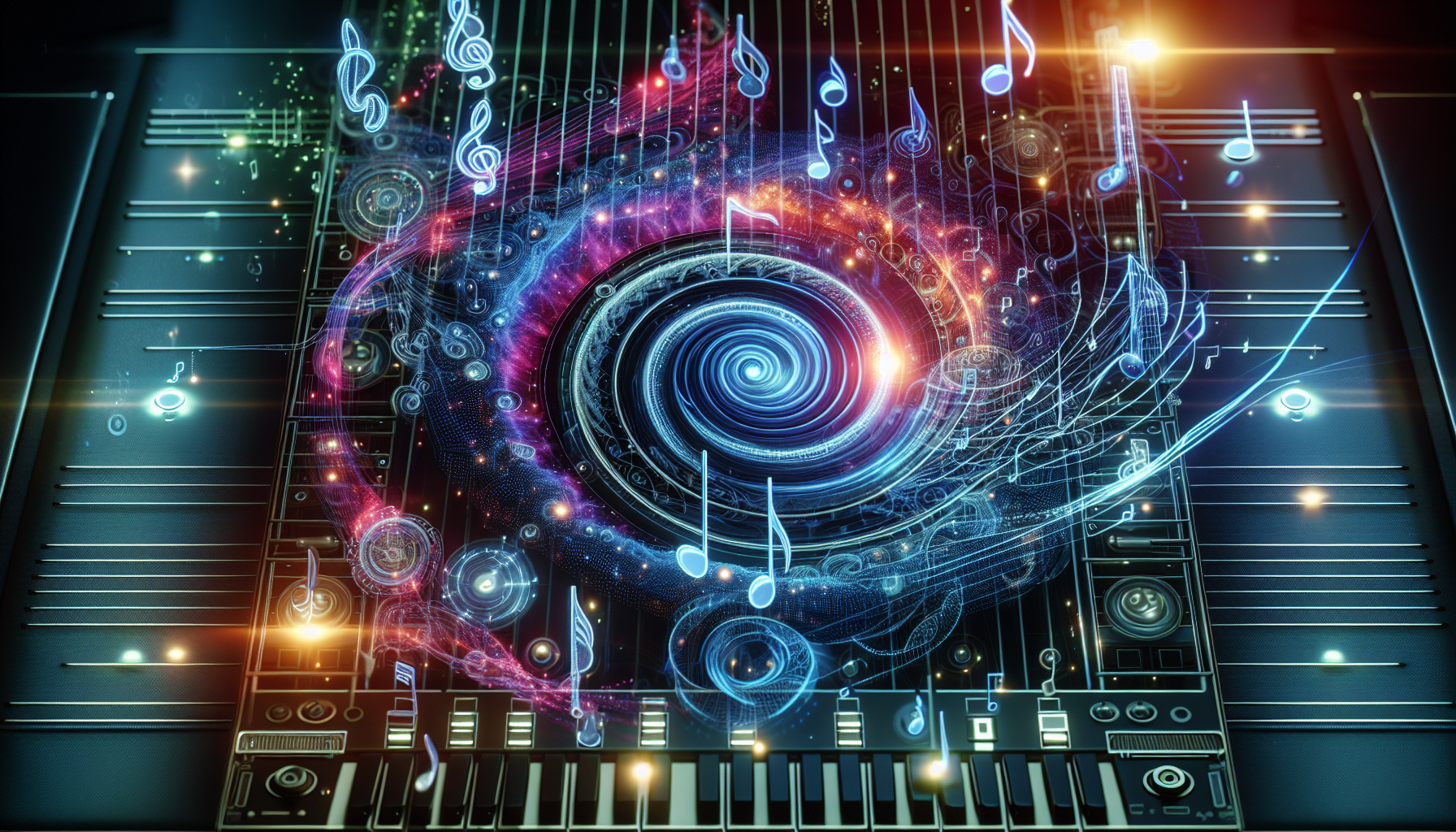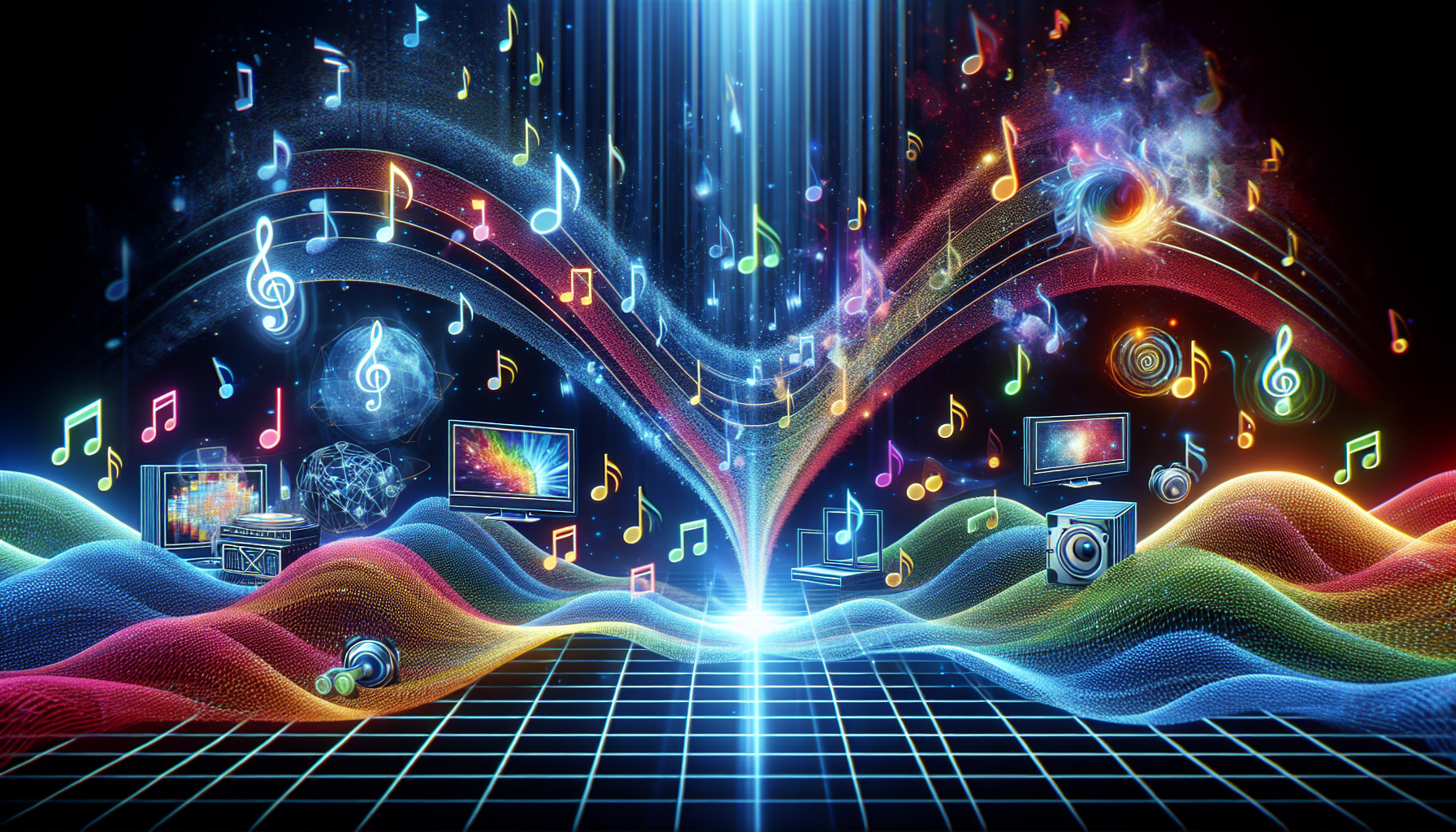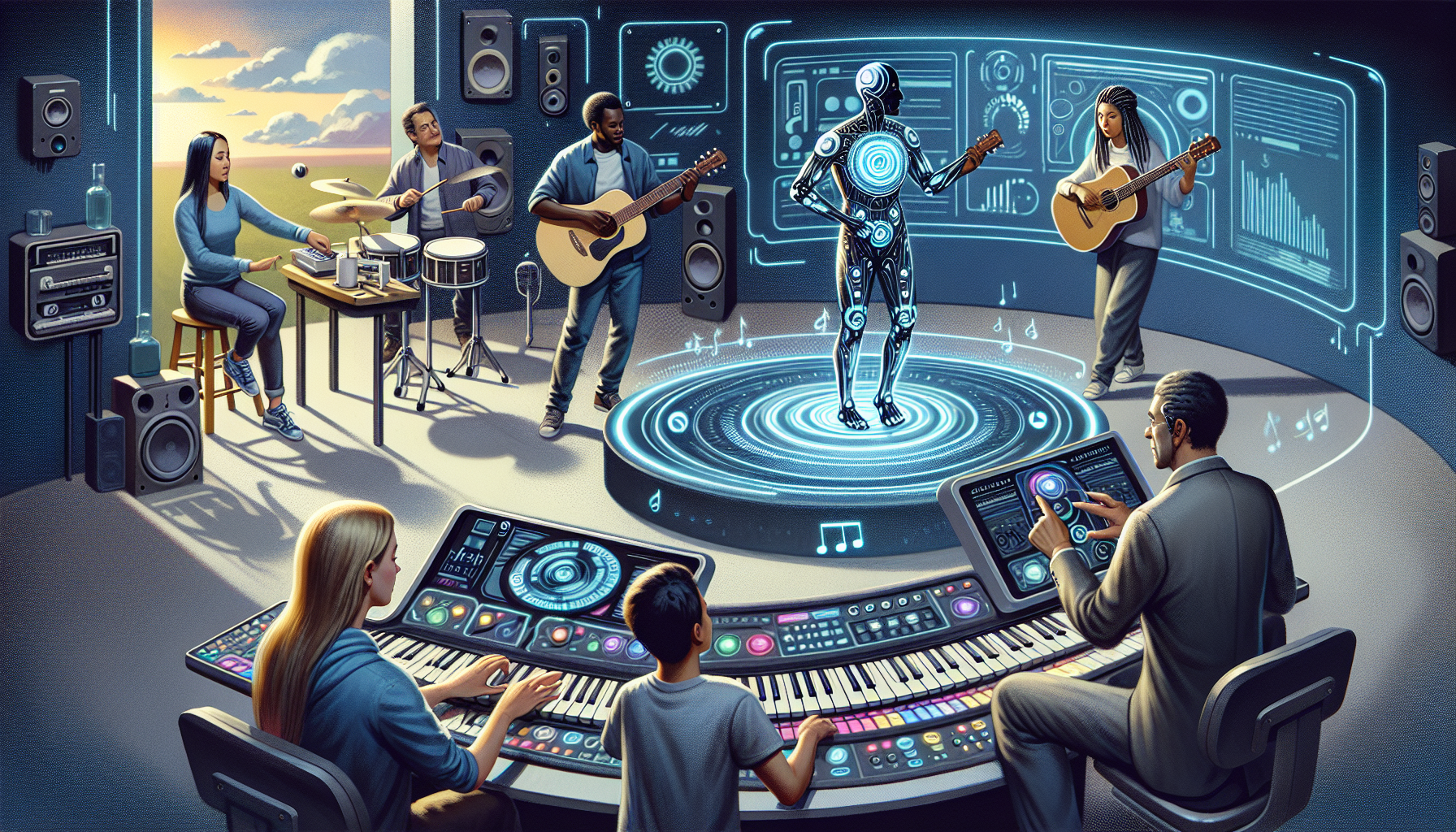Paul
May 29, 2024
AI-generated music is transforming sound creation, offering an accessible platform for innovation and expression. In this article, we explore how AI reshapes the playing field, from Lalals.com enabling instant composition to the implications for music rights and legal boundaries. Step into the future where melodies are crafted by algorithms, and discover the opportunities and considerations that come with it.
Key Takeaways
- AI is shaking up the music industry by enabling artists to create unique compositions, realistic AI vocalists, and transformative soundscapes, significantly expanding creative possibilities across different genres.
- AI-generated music offers customization, real-time collaboration, and efficient production workflows, making it accessible to both amateurs and professionals without the need for in-depth technical knowledge.
- Legal considerations are paramount when incorporating AI-generated voices in music, as it necessitates navigating copyright and intellectual property laws, especially when featuring AI representations of celebrity voices.
Creativity with AI Sound Creation

The rise of AI in the music industry is not just a trend, it’s a revolution. Artists worldwide are increasingly incorporating this cutting-edge technology into their projects, creating unique compositions and enhancing emotional expression in unprecedented ways.
Lalals.com, for instance, empowers users to effortlessly compose original songs, expanding the horizons of musical creativity and streamlining collaboration in music production.
AI-Composed Sounds
Remember the song ‘Daddy’s Car’, the AI-composed melody that sounded eerily similar to a Beatles’ track? That was one of the initial milestones in AI’s foray into music creation, serving as an early proof of concept. Today, AI-powered music engines have evolved significantly, enabling the composition of emotional soundtracks and creating variations on established musical pieces.
With AI, we are witnessing the dawn of a new era in music – a symphony of melodies composed not by human hands, but by intelligent algorithms.
Bringing Lyrics to Life with AI Vocalists
But AI’s influence on music isn’t limited to composing melodies. It also plays a significant role in bringing lyrics to life with realistic, human-like voices. Thanks to advancements in AI and machine learning technologies, voice synthesis has seen exponential improvement, allowing the creation of more lifelike and natural-sounding AI vocals.
These AI vocalists are not just transforming the music production process, but they are also adding a new dimension of creativity and authenticity to it.
Transformative Soundscapes with AI
The real power of AI in music lies in its ability to:
- Create transformative soundscapes
- Blend different genres
- Experiment with unconventional harmonies and rhythms
- Explore unique timbres
This opens up a world of new sonic possibilities. AI is not just enhancing creativity in music production, but it’s also streamlining production, personalizing listening experiences, and posing intellectual property challenges.
Whether it’s classical, pop, or experimental, AI-generated music is making waves across genres, creating compositions in the styles of specific artists or even entirely new styles.
Create Your Unique Sound with AI Generator Tools

AI generated sound creation tools are not just for the tech-savvy. They’re for anyone who wants to create their unique sound. Whether you’re an experienced musician or an absolute beginner, AI-powered tools like Lalals.com are empowering artists to craft unique sounds and streamline music production.
These tools offer extensive customization options, real-time collaboration features, and a range of royalty-free music, catering to various creative needs and tastes.
"Audio creation and audio production have gone from a place of being a highly, highly technical discipline and through the invention of disruptive technology has become less and less about the technical space and more about the creative problem space, thereby allowing more people to participate"
- Jonathan Bailey (iZotope)
Personalization at Your Fingertips
With AI music generators, you have the power of personalization at your fingertips. Here are some customization options that cater to your unique musical preferences:
- Adjust the tempo of a track
- Experiment with different chord progressions
- Add or remove instruments
- Change the style or genre of the music
- Modify the dynamics and intensity of the composition
With real-time edits and live previews, you can hear the changes instantaneously, making music generation and personalization accessible in just a few clicks, without any technical music production expertise or the need for a separate voice generator.
Collaboration and Sharing in the AI Sound Era
Collaboration is a key part of the music creation process, and AI makes it easier than ever. Real-time collaboration features on AI music platforms enable artists and producers worldwide to jointly work on music projects effectively.
Whether you’re creating a hit single with a producer halfway across the world or working on a soundtrack for a video game with a team of composers, AI music tools have got you covered.
Speed and Efficiency in AI Sound Creation
When it comes to music production, speed and efficiency are crucial. And that’s where AI comes into play. AI music creation platforms like Lalals enable users to:
- Rapidly generate full music tracks in a matter of seconds
- Automate song evaluation
- Recommend enhancements
- Take care of mixing
These features streamline the music production workflow.
With AI, you have more time to focus on what you love – creating music.
Legal Landscape of AI Generated Sound Creation

As with any innovation, the use of AI-generated voices comes with its own set of legal considerations, including those surrounding AI generated sound creation. Intellectual property and copyright law primarily govern the use of AI voices, and specific jurisdictions have their own regulations regarding the ai generated voice technology. One such technology that has gained popularity is ai text to speech, which converts written text into spoken words using AI-generated voices, often referred to as computer generated voice, mimicking human speech.
While AI opens up exciting new possibilities in music creation, it’s essential to navigate this legal landscape with care, ensuring the compliant use of AI technology and respecting copyright laws.
Compliant Use of AI Generated Sound Creation Tools
Ensuring the compliant use of AI technology involves obtaining rights and respecting copyright laws. For instance, when using AI voices in commercial projects, users must obtain the rights to use copyrighted content and ensure that the AI voices do not infringe on any third party’s rights.
Companies like Lalals take extra steps to ensure compliance, providing services that are legal and training their AI voices only using legally acquired material.
Navigating Copyright with AI Celebrities
When it comes to using AI-generated celebrity voices, the legal landscape gets a bit more complex. From adhering to publicity rights to avoiding false endorsements, there’s a lot to consider. While it’s legal to release songs featuring AI representations of celebrity voices, it’s crucial not to claim or imply that the actual celebrity personally contributed to the track.
We ensure that our service is compliant and legal and our AI voices are only trained with legal material. You can also release your song when using a celebrity voice which is also fully legal under copyright laws – it’s however recommended that you won’t state that the actual celebrity was featured on this song.
- Lalals
Lalals' Pioneering Future Sound Transformation
At the forefront of the AI voice revolution is Lalals, an AI technology company that’s making waves with its groundbreaking voice cloning technology. Lalals’ advanced AI deep learning models are capable of analyzing and replicating distinct vocal characteristics with precision, enabling users to mimic any chosen voice, including celebrity voices, using the most advanced AI voices. This best AI voice generator is a game-changer in the industry.
From User's Voice to Any Celebrity
Imagine transforming your voice to sound like your favorite celebrity. With Lalals, this is no longer just a dream. Users can simply upload their audio recording to Lalals’ platform and select the voice they want to transform it into.
Lalals’ AI algorithms take care of the rest, delivering high-quality audio recordings after the transformation.
Bluewaters: The New Benchmark in AI Voice Quality
With their new ‘Bluewaters’ AI algorithm Version 2.1, Lalals sets a new benchmark in AI voice quality. This superior synthesis breaks down human voice patterns into digitally replicable components, distinguishing Lalals’ technology.
With the significant reduction of unwanted noises and more real-sounding voices, Bluewaters has left its mark in the world of realistic AI voices, natural sounding AI voices, and AI-generated voices, providing natural sounding speech that users can rely on.
Practical Applications of AI Generated Sounds

Beyond the realm of creativity and music creation, AI-generated sound creation has a host of practical applications. Some of these include:
- Optimizing sound levels at concerts
- Enhancing audio content for businesses
- Creating an engaging audio experience for eLearning
- Providing voices for explainer videos
AI is making its mark in various aspects of our lives.
⭐ Fun fact⭐
AIVA (Artificial Intelligence Virtual Artist) is an AI that composes classical music. It even has a music composition published under its name, making it the first AI to receive recognition as a composer.
Enhancing Digital Content with AI Music
AI can generate music that enhances the ambiance and matches the emotional tone of your YouTube videos. Whether you’re an author transforming written content into engaging audio or a content creator adding a unique touch to videos, AI has the tools you need.
Live Performances and AI - A New Frontier
Could AI change the experience of live concerts by making the music change with the audience’s feelings? Imagine a concert where the music responds to the audience’s reactions, creating a truly immersive and interactive experience.
AI helps musicians create unique compositions that enhance live performances, providing a dynamic experience for the audience.
Monetizing Your AI Sound Creations
While AI-generated music is changing the way we create and experience music, it’s also opening up new avenues for monetization. From creating music videos on platforms like YouTube to selling AI-created tracks on stock music platforms, AI is transforming the music industry’s revenue models.
Streaming Success with AI Generated Tracks
Streaming platforms like Spotify and Apple Music are popular avenues for artists to share their music globally. With AI-generated tracks, artists can now:
- Reach a wider audience
- Monetize their work through channel growth
- Explore additional opportunities like merchandising, affiliate products, and sponsorships.
Creating Royalty-Free Music for Commercial Use
AI-generated music offers a unique solution to a common problem faced by content creators – copyright constraints. Producing and licensing AI-generated, royalty-free music opens new income streams for creators from businesses and individuals.
Our paid service allows for commercial use, so you can release your transformed vocals on platforms like Spotify, YouTube, TikTok, and more. With Lalals, the sky’s the limit for your creative potential.
- Lalals
AI Generator Tools for Every Music Enthusiast

Whether you’re a professional musician or a music enthusiast, AI-powered tools can transform your music creation experience. From generating professional-quality tracks to crafting unique sounds, AI-powered tools like Lalals are making music creation accessible to all.
No Experience? No Problem!
With AI-powered music tools, having no musical experience is no longer a barrier to creating music. AI enables authors to quickly turn their written content into engaging audio experiences using AI-generated voices.
Educational institutions like Berklee College of Music are even adopting AI music technology to enhance the creative process for students.
Advanced Features for Seasoned Musicians
Streaming platforms like Spotify and Apple Music are popular avenues for artists to share their music globally. Tools like Orb Producer Suite help create intricate musical patterns and loops, providing state-of-the-art technology for generating melodies and basslines.
For researchers and practitioners, open-source models like AudioCraft allow training with their own datasets. It fosters advancement in the AI-generated audio field.
Summary
In this post, we explored AI-generated sound creation and music, examining AI’s impact on the music industry. We discussed composing soundtracks, transforming voices to mimic any chosen voice, and navigating legal issues. We also looked at monetizing AI music creations, showing how AI is transforming music creation and experience.
As we continue to explore the power of AI in music, it’s clear that we’re only scratching the surface of what’s possible. The symphony of the future will not only be composed by human hands but also by intelligent algorithms. And as we listen to this new kind of music, we’ll realize that the future of sound creation is not just about the music itself, but about the limitless possibilities that AI brings to the table.
"At the end of the day, AI is not a replacement for human creativity, but rather a tool to enhance it."
- Musicians Institute
Frequently Asked Questions
All you need to know about Lalals.
What is AI-generated music and how does it work?AI-generated music refers to music created by artificial intelligence systems using algorithms that analyze existing musical data to compose new music. These systems can learn from vast amounts of musical compositions to generate music that has structure, rhythm, and harmony. |
Can AI truly replicate the emotional depth of music composed by humans?AI-generated music is advancing in its ability to mimic human emotional expression in compositions. However, while AI can produce technically proficient music, the subtleties of human emotion and the stories behind them often require human input and interpretation. |
What are the legal implications of using AI to create music?The use of AI in music creation raises several legal issues, primarily around copyright and intellectual property. Depending on how the music is generated, it may be considered a derivative work, and using AI to mimic specific artists or styles can further complicate copyright issues. Choosing the right platform wisely is critical because it can significantly reduce the risk of legal issues. |
How are AI vocalists changing the music production landscape?AI vocalists, which use synthesized voices generated by AI, are becoming increasingly realistic and are used not only in musical tracks but also in live performances and virtual reality environments. They offer a cost-effective and versatile alternative to human vocalists. |
What future developments can we expect in AI-generated music?Future advancements in AI-generated music are expected to focus on improving the emotional intelligence of AI systems, enhancing their ability to generate music for specific therapeutic, educational, or entertainment purposes, and expanding their capabilities in live interaction and improvisation during performances. |
Convert Your Voice with AI
Make your voice sound like those of famous arists.
Join Lalals and use our hyper-realistic voice converter now.